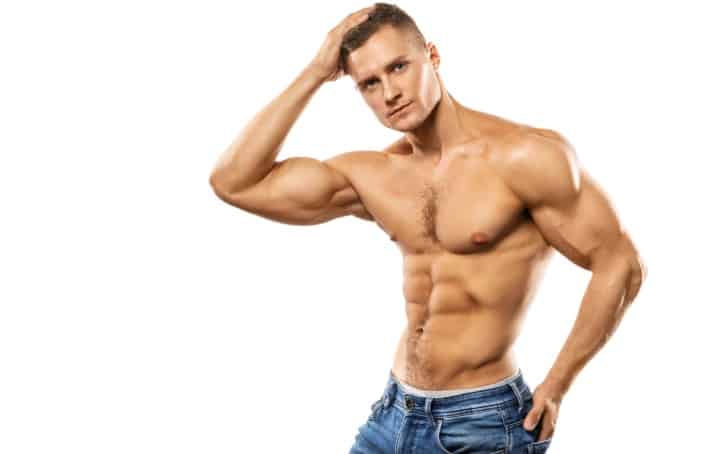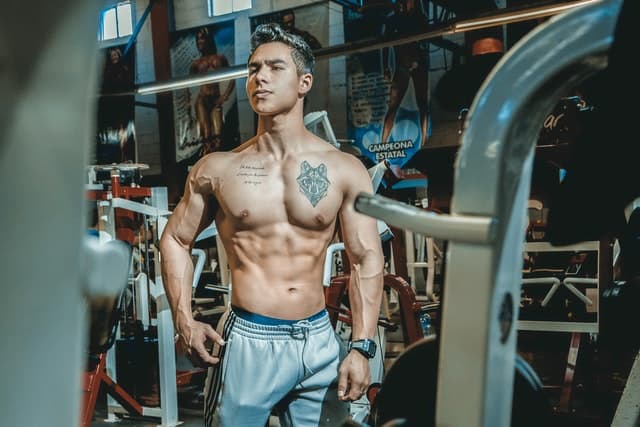Bodybuilding vs Aesthetics: (training, strength, workout)
Max Health Living is a reader-supported site. Purchases made through links may earn a commission. Learn more.
Bodybuilding vs aesthetics – what’s the right approach to getting the body you want?
What’s the difference between the two, and how did we get to the point where they need to compete? Many people think that the two goals are one and the same, but they could not be more different.
There is a big difference between bodybuilding and aesthetics. Bodybuilding is all about developing muscle mass while aesthetics is all about developing a lean, toned physique. In fact, many bodybuilders have trouble achieving an aesthetic physique because their muscles are too bulky and overpowering.
But that’s not all. of course, there’s more.
This is why we’re going to discuss where the “aesthetics movement” came from if aesthetics is bodybuilding, and how the two compare.
Let’s clarify what it means and get into the important stuff.
What is Aesthetics?
Aesthetics is the name you’ll see all over Instagram for a new-age focus on fitness model styles of bodybuilding. It focuses on a “more realistic” physique with a greater focus on proportion at the cost of size.
The aesthetics movement is all about the aesthetic physiques of silver- and golden-age bodybuilding.
Size is not as important, while the focus on proportions – especially in the upper body – takes center stage.
Guys interested in aesthetics typically look to the physiques of bodybuilders like Frank Zane and Serge Nubret for their proportions and conditioning. Most people don’t compete at this level but will typically try to build their bodies to “fitness model” standards of size and conditioning.
The Aesthetics Movement: Is It Bodybuilding

The Aesthetics movement is not a type of bodybuilding – it’s a social media subculture with roots in bodybuilding but doesn’t involve any competition.
Aesthetics is about looking good and staying lean and relatively big.
It’s also associated with other cultures like fitness modeling, Instagram influencers of note, and young men’s lifestyles.
The “aesthetics movement” is an offshoot of the silver- and the golden age of bodybuilding before bodybuilding’s focus on size took off in the 80s and 90s. The aesthetics movement is roughly as old as the social media age – with characters like Zyzz gaining prominence in 2011.
It wouldn’t be too far off to say that aesthetics is the soft-core bodybuilding of the internet generation. It’s how the new generation adapted old-school bodybuilding in a more image-conscious age.
One of the other important things to remember is that the aesthetic physique of the movement is just easier to achieve and maintain. While it still requires plenty of muscle mass and good conditioning, it’s not as hard to get and keep as the bodybuilder’s often-exaggerated stature.
Most guys in the aesthetics movement are just somewhat-big and lean compared to real bodybuilders. It’s a physique that is more balanced against the lifestyles you’ll see in this subculture, with many influencers focusing on how physique serves clout or reach than bodybuilding shows.
That’s not intended as a put-down.

Guys who’ve bought into the aesthetic movement may not be as disciplined as top bodybuilders with eating and massing, nor achieve the same peeled competition-day bodies.
However, they’ve chosen this compromise, and it has become popular with the less-hardcore “aesthetics” bodybuilding fans. Whether or not you like that is a matter of personal preference and how your physique vs life balance shakes out.
Bodybuilding vs Aesthetics: What Can We Learn
Whether you prefer bodybuilding or the increasing uptake of the aesthetics movement, it’s hard to deny the popularity. It’s good to ask why it’s so popular and what it offers that people are drawn to.
The aesthetics movement is popular for a few reasons: it’s easier than bodybuilding, the physiques have a broader appeal, and it is a great entry point for new bodybuilders. It’s an easy pipeline for bigger, more competitive physiques over time.
First, the accessibility: aesthetics is easy to get into. More people can do it, it’s non-competitive, and the focus on simply improving the body is always popular.
These are the same reasons bodybuilding has always been popular – but with a lower barrier to entry and some funky characters.
The focus on proportion and silhouette are also fantastic – they’re eternal parts of bodybuilding that can be appreciated at any size. This is paired with conditioning, which can be driven to absurd levels with less mass, where trading off size for leaner physiques isn’t a problem.
It’s also a good pipeline for more competitive bodybuilding, with men’s fitness model categories (and above) seeing increased uptake due to the aesthetics movement.
This makes it a good intermediary for bodybuilding, but with a more broadly-appealing and socially-accepted set of ideals.
Comparison |
Purpose |
Machine or Free Weight |
Meal Frequencies |
Bodybuilding |
For increasing muscle size as much as possible | Bodybuilders prefer free weight because it helps in developing strength and assists in the development of stabilizer muscles | Eating 6-8 clean meals a day to fulfill macro requirements |
Aesthetics |
For putting on muscle size at the right place to generally look good | Aesthetics involve the use of machines to isolate particular muscle groups better | Eating 3-4 meals a day (basic knowledge of carb cycling and ketogenic diet) |
Bodybuilding and Aesthetics: FAQs
What is the Difference Between Bodybuilding and Aesthetics?
Bodybuilding is a competitive endeavor that culminates on the stage, being judged, and ranking among other bodybuilders. Aesthetics doesn’t have any of those; though it may overlap with some bodybuilding competitions, it’s physique-improvement for its own sake.
Bodybuilding is more hardcore than aesthetics, with a higher standard of dieting required and a more insane combination of size and conditioning.
Aesthetics is more lifestyle-focused, while bodybuilding is the lifestyle for most practitioners and trainees.
There are many big differences between the two. Still, the simple version is this: aesthetics is a non-competitive physique-for-life approach, while bodybuilding is the competitive pursuit of the best combination of size, proportion, and conditioning.
Should I Train For Aesthetics Or Strength?
Initially, you should train for aesthetics and strength as a beginner – when the overlap is closest. Afterward, it would be best to decide which is your top priority, but you can always train for aesthetics and strength simultaneously.
We’ve discussed bodybuilding vs strength training before, and it’s a hot topic.
The important thing is that your muscles can get stronger as they get bigger, and they almost always get bigger as you get stronger.
If you’re unsure which to choose – you don’t know if you want to compete in bodybuilding or powerlifting – then don’t choose. There’s no reason you can’t train for both, and power building is a type of training that caters to exactly that choice.
Who is the Most Aesthetic Bodybuilder?
That depends on whether you mean aesthetic in the term we’ve described above (the aesthetics movement) – or just the most aesthetically pleasing. Then, if it’s the latter, it depends on your opinion.
Most people believe that Frank Zane was the most aesthetic bodybuilder, in-line with the ‘aesthetics movement’ and its ideals. He was not very big, proportion-focused, and had fantastic conditioning – even beating bigger men in competition.
Serge Nubret is also one of the most widely-lauded bodybuilders for his aesthetics.
Again, he was smaller than many other bodybuilders of the time but had astounding proportions and great conditioning.
In the modern era, guys like Chris Bumstead are popular with bodybuilders and the aesthetics crowd as a point of overlap. The Venn diagram between these two communities shows that “CBum’s” physique is among the most agreed-upon examples of excellent proportions, size, and conditioning.
This question is very personal and depends on what you think is aesthetic.
Frank Zane may be the strongest answer to the question – but there are many aesthetic bodybuilders in the past and active today!
How To Train For Aesthetics
Training for aesthetics requires a mid-large amount of muscle and a low body fat percentage. It also focuses on the V-taper most, focusing on the lats, pecs, and deltoids. These should focus on an ‘aesthetics’ training program, along with the core muscles.
The main focus is developing a lot of muscle and simply getting very lean.
With proper training focus on the lats, core, and shoulder girdle, it is a smaller commitment than a conventional open bodybuilding physique.
It’s important to remember that many aesthetics-style physiques were still built with anabolic support. While you can make significant gains without them, some physiques’ textural appearance and ridiculous conditioning aren’t possible.
You’ll also have to deal with your proportions – and remember that aesthetics-style physiques are built around ridiculous V-tapers with very small waists.
Check-in with yourself before setting goals based on other people’s insertions and proportions.
Are Aesthetic Physiques Functional?
Aesthetic physiques aren’t functional just because they look good – but you can build an aesthetic physique using functional training. Many forms of functional exercise are just muscle-building exercises but with a focus on moving well.
One good example is bodybuilding vs calisthenics, which we’ve discussed before.
Ring rows and ring push-ups are “functional”, but they also provide a sick pump and fantastic muscle gains. You could say the same thing about lunges, Bulgarian split squats, Romanian deadlifts, and dumbbell press.
Functional is a bit of a buzzword, but many functional strength exercises can be used to build commanding, aesthetic physiques. Your individual exercise choices will decide if your aesthetic physique is functional or not!
Final Thoughts: Bodybuilding vs Aesthetics
The aesthetics movement is an increasingly popular and obvious force in bodybuilding.
It might not be bodybuilding, but it’s a feeder of talent and interest; it builds more hype for traditional bodybuilding. It may include a lot of influencers, but the physiques themselves are inspiring.
Something new-generation about the aesthetics movement is popular with millennials and zoomers, but something old-school about it. It’s got some great scope for building a deeper talent pool and improving the depth of lighter classes in bodybuilding, even if it does have drawbacks.
Suppose you’re looking to build an aesthetic physique. In that case, bodybuilding is still the training wisdom and methodology to follow, and aesthetics wouldn’t exist without the bodybuilding culture as it is.
There’s something to learn about accessibility, proportion, and building hype from the aesthetics movement – even if you’re looking for a much larger or competitive physique yourself.
Important Disclaimer: The information contained on MAX HEALTH LIVING is intended for informational and educational purposes only. Any statements made on this website have not been evaluated by the FDA and any information or products discussed are not intended to diagnose, cure, treat, or prevent any disease or illness. Please consult a healthcare practitioner before making changes to your diet or taking supplements that may interfere with medications.
Who We Are

We are a team of fitness, health, and supplement experts, and content creators. Over the past 4 years, we have spent over 123,000 hours researching food supplements, meal shakes, weight loss, and healthy living. Our aim is to educate people about their effects, benefits, and how to achieve a maximum healthy lifestyle. Read more.



